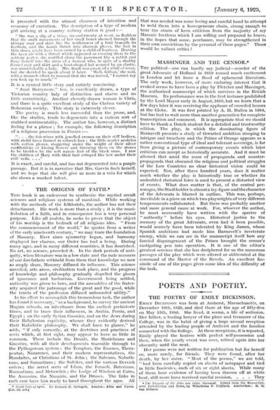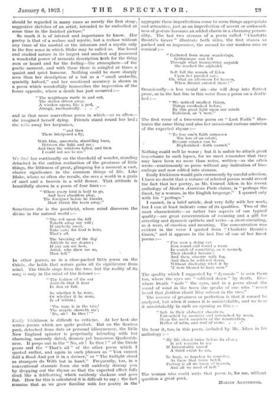POETS AND POETRY .
THE POETRY OF EMILY DICKINSON.
EMILY DICKINSON was born at Amherst, Massachusetts, on December 10th, 1830, and died there at the age of fifty-five on May 15th, 1886. She lived, it seems, a life of seclusion. Her father, a leading lawyer of the place and treasurer of the College, was in the habit of giving a large annual reception attended by the leading people of Amherst and the families connected with the College. At these receptions, it is reported, Emily played the hostess with perfect self-possession and then, when the yearly event was over, retired again into her obscurity until the next.
Her poems were not written for publication but for herself or, more rarely, for friends. They were found, after her death, by her sister. " Most of the poems," we are told, " had been carefully copied on sheets of notepaper and tied in little faseicuics, each of six or eight sheets. While many of them bear evidence of having been thrown off at white heat, still more have received careful revision. . . . They
• The Tragedy of Sir John ran Olden Barnaes/t. Edited from the Manuscript, with Introduction and Notee. by Villhelmhia P. Frilliack. Amsterdam: IL II, van Damen.
should be regarded in many cases as merely the first stray, suggestive sketches of an artist, intended to be embodied at some time in the finished picture."
So much it is of interest and importance to know. Her poetry is that of a recluse and mystic, but a recluse without any trace of the morbid or the inhuman and a mystic only in the free sense in which Blake may be called so. She loved and studied nature in its largest and smallest and possessed a wonderful power of accurate description both for the thing seen or heard and for the feeling—the atmosphere—of the poetic moment, and with these there is mingled at times a quaint and quiet humour. Nothing could be more sharply seen than her description of a bat as a " small umbrella, quaintly halved," and her emotional accuracy is shown in a poem which wonderfully transcribes the impression of the house opposite, where a death has just occurred :—
" The neighbours rustle in and out, The doctor drives away.
A window opens, like a pod, Abrupt, mechanically. . . ."
and in that more marvellous poem in which—as so often— she imagined herself dying. Friends stand round her bed ; she wills away her keepsakes,
" and then There interposed a Hy, With blue, uncertain, stumbling buzz, Between the light and me ; And then the windows failed, and then I could not see to see."
We find her continually on the threshold of wonder, standing detached in the sudden realization of the greatness of little things, the littleness of great, glimpsing for a moment a vast, elusive significance in the common things of life. Like Blake, whom so often she recalls, she sees a world in a grain of sand and a heaven in a wild flower. That attitude is beautifully shown in a poem of four lines :- "Where every bird is bold to go, And bees abashless play,
The foreigner before he knocks Must thrust the tears away."
Sometimes she is the pantheist, whose mind discovers the divine in the natural world :- " The red upon the hill Taketh away my will ; If anybody sneer,
Take care, for God is here, That's all.
The breaking of the day Addeth to my degree ; If any ask me how, Artist, who drew me so, Must tell."
In other poems, as in a close-packed little poem on the Oriole, she holds that nature gains all its significance from mind. The Oriole sings from the tree, but the reality of its song is only in the mind of the listener:-
" The fashion of the ear Attireth that it hear In dun or fair.
So whether it be rune, Or whether it be none, Is of within ; ' The tune is in the tree,' The sceptic showeth me ; ' No, sir ! In thee !'"
Emily Dickinson is difficult to criticize. At her best she writes poems which are quite perfect. But on the flawless poet, detached from date or personal idiosyncrasy, the little New England spinster is perpetually intruding with her charming, narrowly dated, demure yet humorous Quakerish- ness. It peeps out in the " No, sir ! In thee ! " of the Oriole poem and the " That's all " of the other poem which I quoted earlier, and again in such phrases as " You cannot , fold a flood And put it in a drawer," or " The twilight stood as strangers do With hat in hand." Frequently, too, in a conventional stanzaic form she will suddenly dismay you by dropping out the rhyme so that the expected effect falls dead like a fiddlestring which suddenly slackens and goes flat. How far this is calculated it is difficult to say ; the fact remains that as we grow familiar with her poetry in the
aggregate these imperfections come to seem things appropriate and attractive, just as an imperfection of accent or awkward- ness of gesture becomes an added charm in a charming person- ality. The last two stanzas of a poem called " Charlotte Bronto's Grave " illustrate both sides, the first stanza so packed and so impressive, the second to our modern ears so comical :—
" Gathered from many wanderings, Gethsemane can tell
Through what transporting anguish She reached the asphodel.
Soft fall the sounds of Eden Upon her puzzled car ; Oh, what an afternoon for heaven, When Brontii entered there !"
Occasionally—a less venial sin—she will drop into flattest prose, as in the last line in this verse from a poem on a death-
bed :—
" We noticed smallest things, Things overlooked before,
By this great light upon our minds Italicized, as 't were."
The first verse of a two-verse poem on " Lost Faith " illus- trates the same thing and also her occasional curious omission of the expected rhyme :— " To lose one's faith surpasses The loss of an estate,
Because estates can be Replenished—faith cannot."
Nothing could well be worse ; but it is unfair to attach great importance to such lapses, for we must remember that they may have been no more than notes, written—as she often wrote—continuously as prose without any indication of line- endings and now edited into stanzas.
Emily Dickinson would gain enormously by careful selection. I have no doubt that a volume of selected poems would reveal the fact that her poetry, as Mr. Conrad Aiken in his recent anthology of Modern American Poets claims, is " perhaps the finest, by a woman, in the English language." I quarrel only with his " perhaps."
I cannot, in a brief article, deal very fully with her work, but I can at least indicate some of its qualities. Two of the most characteristic—or rather two aspects of one typical quality—are great concentration of meaning and a gift for arresting and dynamic epithets and verbs—a short-circuiting, as it were, of emotion and meaning. The concentration was evident in the verse I quoted from " Charlotte Bronte's Grave," and it appears in the last line of one of her finest poems :—
" I've seen a dying eye Run round and round a room In search of something, as it seemed, Then cloudier become ; And then, obscure with fog, And then be soldered down, Without disclosing what it be 'T were blessed to have seen."
The quality which I suggested by " dynamic " is seen there too, where the eyes arc " soldered down " by death. Else- where Death " nails " the eyes, and in a poem about the sound of wind in the trees she speaks of one who " never heard that fleshless chant Rise solemn in the tree."
The essence of greatness or perfection is that it cannot be analysed, but when it comes it is unmistakable, and we hear it unmistakably in such an opening as this :—
" Safe in their alabaster chambers,
Untouched by morning and untouched by noon, Sleep the meek members of the resurrection, Rafter of satin, and roof of stone. . . ."
We hear it, too, in this poem, included by Mr. -Aiken in his anthology :-
" My life closed twice before its close ;
It yet remains to see If Immortality unveil A third event to me,
So huge, so hopeless to conceive, As these that twice befell.
Parting is all we know of heaven, And all we aced of hell."
MARTIN AR3ISTRONG.



















































 Previous page
Previous page